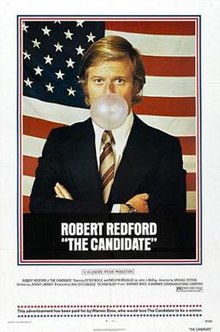The Candidate (1972 film)
| The Candidate | |
|---|---|
 Theatrical release poster | |
| Directed by | Michael Ritchie |
| Written by | Jeremy Larner |
| Produced by | Walter Coblenz |
| Starring | Robert Redford Peter Boyle |
| Cinematography | Victor J. Kemper John Korty |
| Edited by | Robert Estrin Richard A. Harris |
| Music by | John Rubinstein |
| Distributed by | Warner Bros. |
Release date |
|
Running time | 109 minutes |
| Country | United States |
| Language | English |
The Candidate is a 1972 American drama film starring Robert Redford. The screenplay was written by Jeremy Larner, a speechwriter for Senator Eugene J. McCarthy during McCarthy's campaign for the 1968 Democratic Presidential nomination.
Plot
Marvin Lucas (Peter Boyle), a political election specialist, must find a Democratic candidate to unseat California U.S. Senator Crocker Jarmon, a popular Republican. With no big-name Democrat eager to enter the seemingly unwinnable race, Lucas seeks out Bill McKay (Robert Redford), the idealistic, charismatic son of former governor John J. McKay (Melvyn Douglas).
Lucas gives McKay a proposition: Jarmon cannot lose and, since the race is already decided, McKay is free to campaign saying exactly what he wants. McKay accepts to have the chance to spread his values, and hits the trail. With no serious Democratic opposition, McKay cruises to the nomination on his name alone. Lucas then has distressing news: according to the latest election projections, McKay will be defeated by an overwhelming margin. McKay counted on losing but not on being humiliated, so he broadens his message to appeal to more voters.
McKay campaigns across the state, his message growing more generic each day. This approach lifts him in the opinion polls, but he has a new problem: Because McKay's father has stayed out of the race, the media speculates his silence is an endorsement of Jarmon. McKay begrudgingly meets his father and tells him the problem, and the elder McKay tells the media he is simply honoring his son's wishes to stay out of the race.
McKay continues to gain in the polls until he is only nine points down. Jarmon then proposes a debate. McKay agrees to give tailored answers, but just as the debate is ending, McKay has a pang of conscience and blurts out that the debate addressed no real issues, such as poverty and race relations. Lucas is furious, as this will hurt the campaign. The media try to confront McKay backstage, but arrive as his father congratulates him on the debate; instead of reporting on McKay's outburst, the story becomes the reemergence of the former governor to help his son. The positive story, coupled with McKay's father's help on the trail, further closes the polling gap.
On election day, McKay wins. In one of the movie's famous scenes, he escapes the victory party and pulls Lucas into a room while throngs of journalists clamor outside. McKay asks Lucas, "Marvin ... What do we do now?" The media throng arrives to drag them out, and McKay never receives an answer.
Cast
- Robert Redford as Bill McKay
- Peter Boyle as Marvin Lucas
- Melvyn Douglas as Former California Governor John J. McKay
- Don Porter as Senator Crocker Jarmon
- Allen Garfield as Howard Klein
- Karen Carlson as Nancy McKay
- Quinn K. Redeker as Rich Jenkin (as Quinn Redeker)
- Morgan Upton as Wally Henderson
- Michael Lerner as Paul Corliss
- Kenneth Tobey as Floyd J. Starkey
- Natalie Wood as Herself
- Chris Prey as David
- Joe Miksak as Neil Atkinson
- Jenny Sullivan as Lynn
- Tom Dahlgren as The pilot
- Gerald Hiken as The station manager
- Leslie Allen as Mabel
Reception
The film was critically acclaimed. New York Times reviewer Vincent Canby applauded Redford's performance and commented that "The Candidate is serious, but its tone is coldly comic, as if it had been put together by people who had given up hope."[1] Christopher Null, from filmcritic.com, gave the film 4.5/5, and said that "this satire on an American institution continues to gain relevance instead of lose it."[2] The film holds a score of 95% on Rotten Tomatoes based on eighteen critical reviews. [3]
Awards
The film won a Best Writing Oscar for Larner and was also nominated for Best Sound (Richard Portman, Gene Cantamessa).[4]
See also
References
- ^ N.Y. Times review by V. Canby June 30, 1972
- ^ Filmcritic.com review
- ^ "The Candidate". Retrieved 23 June 2013.
{{cite web}}: Cite has empty unknown parameter:|1=(help) - ^ "The 45th Academy Awards (1973) Nominees and Winners". oscars.org. Retrieved 2011-08-28.
